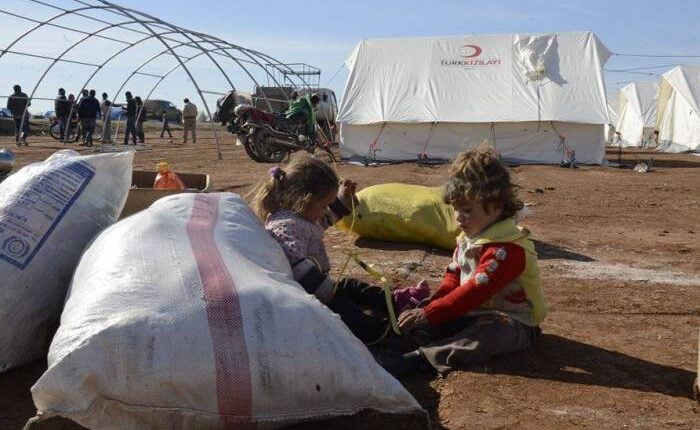“These aids can only serve as animal fodder” – Turkish organization distributes rotten food items to internally displaced residents in the countryside of Aleppo
Recently, the Turkish organization “AFAD” distributed putrefied groceries to the residents of the Bab As-Salama camp, situated in the Northern countryside of Aleppo.
Activists from the Syrian Observatory for Human Rights received a copy of footages and video tapes, showing the distributed groceries and grains to have gotten moldy, with insects having multiplied within the bags – a direct result of the items’ storage in warehouses that do not comply to the recommended hygiene standards.
Pursuant to several sources, a large portion of the distributed items are inappropriate for human consummation due to the many insects having reproduced on them. “B.A.”, the abbreviation of the name for one of the beneficiaries from the AFAD organization testified the following: “The distributed aid items can only serve as animal fodder”. In fact, the items were piled up in the storages for several months before being distributed to the beneficiaries, exposing them to insect-transmitted pests and illnesses. Grains and other food items require certain conditions for their proper storage, such as sun light and specific temperatures as well as chemical sterilization and the packaging of bags before being stored so they will not expire and remain consumable for several months.
While speaking to the Syrian Observatory for Human Rights, Abu Abdullah, a displaced resident from the countryside of Southern Aleppo to the As-Salama camp, stated that the grains in the food basket, worth 6 Turkish Lira per Kilo, were sold as animal fodder. He further emphasized that some merchants purchase food baskets to add several types of grains to mixtures, used for increasing the weight of sheep and claves, such as fava beans, peas, chickpeas and beans due to their richness in protein and minerals that facilitate the process of gaining weight.
Conditions in camps for internally displaced residents are already dire as people constantly suffer from water and food shortages as well as unhygienic conditions. Thus, a distribution of putrefied and molded food items that may poison the Bab As-Salama residents, constitutes a grave violation and further amplifies the plight of internally displaced refugees.

